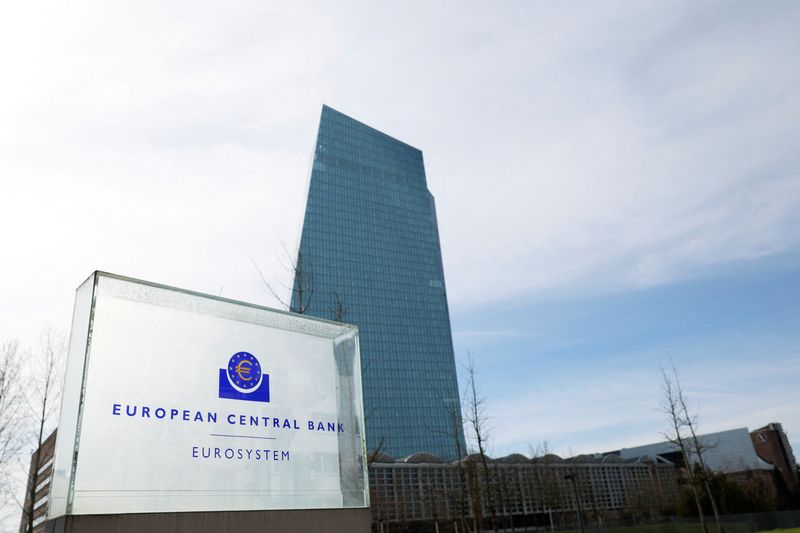Timing is everything: Five questions for the ECB

FILE PHOTO: A view shows the logo of the European Central Bank (ECB) outside its headquarters in Frankfurt, Germany March 16, 2023. REUTERS/Heiko Becker/File Photo
By Dhara Ranasinghe and Stefano Rebaudo
LONDON – The European Central Bank meets on Thursday, with markets eyeing any nudge towards an interest rate cut as inflation weakens.
The ECB, expected to hold rates at a record 4%, is navigating a tricky path between keeping rates high long enough to contain inflation while not cutting too late as price pressures ease quickly.
“ECB speakers, even if they are of different views on timing, have acknowledged that rate cuts are coming,” said Morgan Stanley chief European economist Jens Eisenschmidt. “The March meeting will be the opportunity to change the language in the statement to signal this.”
1/ Could the ECB change its communication?
The ECB has pushed back against rate cut talk and markets now expect 90 basis points (bps) of cuts this year, versus 150 bps at the start of 2024.
Still, easing is on the cards and traders want guidance on the timing of a first move.
Slovakia’s central bank head, Peter Kazimir, says the ECB will acknowledge an improved inflation outlook on Thursday but must avoid any rate cut commitment yet.
“Market pricing (of rate cuts) has moved towards a more sensible direction, decreasing the need for pushback,” said Berenberg European economist Salomon Fiedler, adding ECB chief Christine Lagarde will likely reiterate data dependency.
2/ Is there a risk the ECB cuts rates too late?
For sure. Delaying rate cuts raises the chance of moving more aggressively later if inflation falls faster than anticipated.
Bank of France head Francois Villeroy de Galhau says “acting gradually and pragmatically may be preferable to deciding too late and then having to over-adjust.”
There’s also a case for not rushing. Lagarde has stressed the ECB has to avoid cutting rates too early as that could prolong high inflation.
Even Greece’s Yannis Stournaras reckons the “optimal timing” might be the end of the first half.
“If that’s the messaging coming from a Greek central banker, that’s probably quite a good indicator that June is going to be when we see action, as opposed to sooner,” said Gareth Hill, portfolio manager at Royal London Asset Management.
3/ What’s the big deal with wages?
Well, the ECB has singled out wages as the single most important factor determining whether it can cut rates.
Negotiated wage growth slowed to 4.46% in the fourth quarter from 4.69% in the previous quarter, the highest on record going back to 2005.
The more forward-looking Indeed wage tracker peaked in late 2022 but was still at 3.9% in January, above the 3% the ECB says is consistent with the 2% inflation target.
First quarter wage data, crucial to the ECB, will only come out in May, so June will be the first occasion policymakers may see enough evidence of slowing wage growth.
4/ What will the ECB’s latest forecasts show?
Economists expect downward revisions to 2024 growth and inflation forecasts.
Euro area growth has hovered around zero for sixth straight quarters and the European Commission just cut its GDP growth forecast for this year to 0.8% from 1.2%.
Data on Friday showed inflation in the bloc eased to 2.6% in February from 2.8% a month earlier.
“The ECB’s forecast for headline inflation should come down as energy prices are around 20% weaker than at the time of the December macro projections,” noted Nomura senior European economist Andrzej Szczepaniak.
5/ Does it matter if the ECB cuts before the Fed?
Not really. The euro zone economy is weaker than the United States, meaning there’s a stronger case for monetary easing.
But history suggests that the ECB moves after the Federal Reserve, so who moves first is topical, especially since an early ECB rate cut could pressure the euro.
Traders see a high chance that both the ECB and Fed will start cutting rates in June, according to LSEG data, with a slightly higher probability for the ECB.
“I don’t think there’s any sound economic argument to say that the ECB cannot go until the Fed goes,” said Barclays head of euro rates strategy Rohan Khanna.








